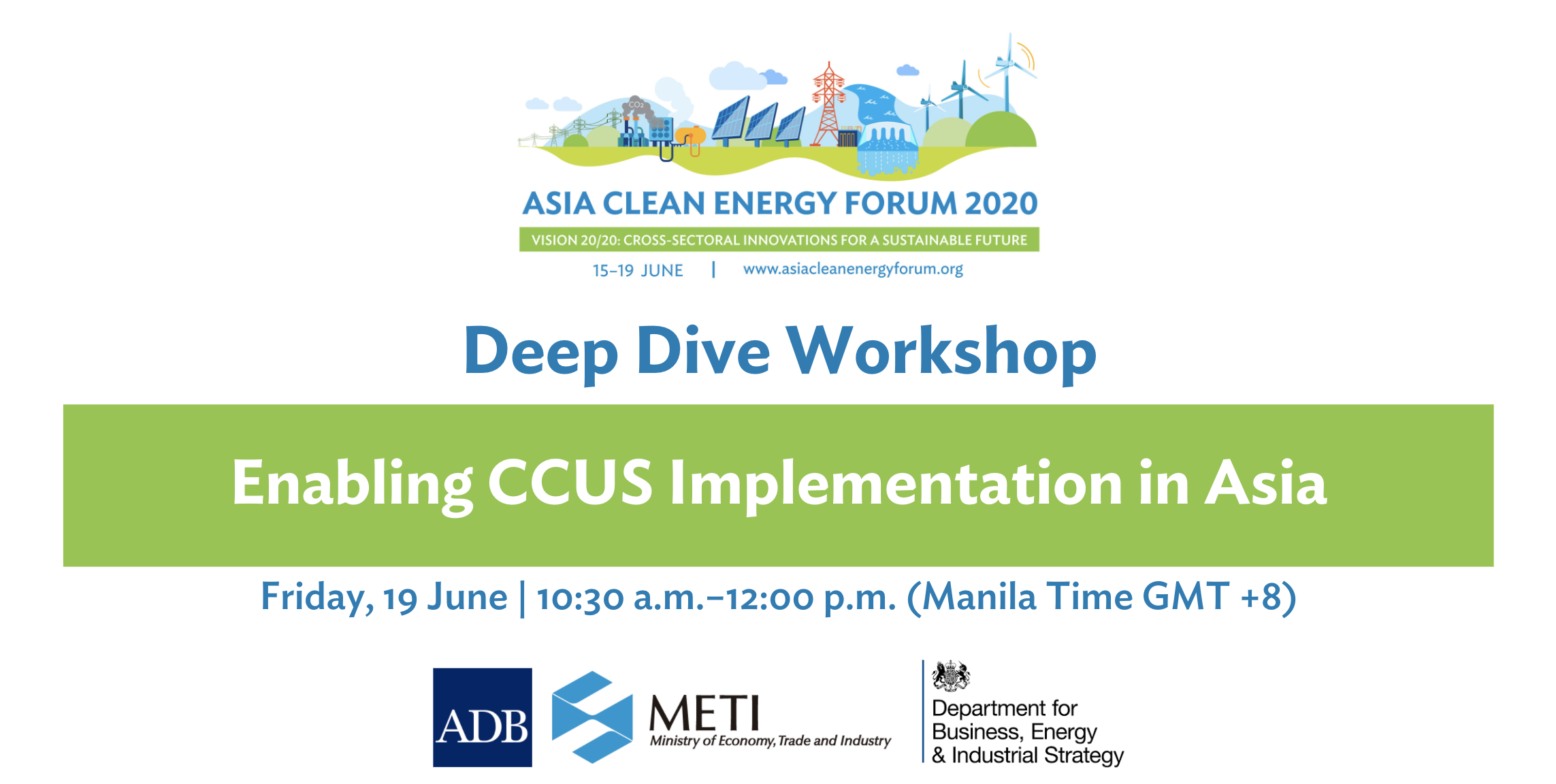
Background
International Energy Agency has indicated that the most economical pathway to reduce GHG emission under sustainable development scenario expects about 9% contribution from carbon capture, utilization and storage (CCUS) (World Energy Outlook, 2019). The Global CCS Institute (Global Status of CCUS, 2019) has estimated that ‘To meet climate change mitigation targets, an estimated 2000- plus large-scale CCS facilities must be deployed by 2040’. Based on the current state of economy and population, it is easy to conclude that Asia has the most considerable potential to reduce the GHG emission by implementing CCUS technologies and the time to act is now.
The Asian Development Bank (ADB) has been promoting CCUS in Asia since 2009. ADB has been working with its developing member countries (DMCs) to identify new opportunities in CCUS, prepare regulatory frameworks and grow a research network to create opportunities for low carbon development through CCUS implementation. In order to maintain the momentum gathered over the years and take, the march towards a low carbon society, ADB is planning virtual events in 2020 edition of Asia Clean Energy Forum (ACEF). This arrangement will not only ensure the safety of the participants but, will also pose an opportunity to reach many more stakeholders who are based in the DMCs of ADB.
ADB has received an active support in organization of CCUS events from partner organizations. Department of Business, Energy and Industrial Strategy (BEIS), Government of UK and Ministry of Economy Trade and Industry, Government of Japan (METI) are partners for the Deep Dive Workshop ‘Enabling CCUS Implementation in Asia’. Clean Energy Ministerial (CEM) has partnered with ADB in organization of the side event on ‘Key Financing Principles of CCUS’.
Objectives, Output and Outcomes of the Events
The objective of the CCUS events was to generate awareness about CCUS technology amongst the stakeholders of Asia. Its intended output was more to enlighten stakeholders who can identify the relevant new CCUS technologies in the context of their organizations and countries. Another intended result was to provide a platform to the financial community where they can deliberate on how finance and catalyze low carbon development through CCUS. The intended outcome of the workshop was the consideration of CCUS as a potential technology option for the decarbonization of the country or organization.
Agenda
| Time (Manila) | Session/Speakers |
|---|---|
| 10:30-10:35 a.m. |
Welcome Remarks and Introduction to ADB’s activities on CCUS Speaker: Priyantha Wijayatunga, Director of Energy Division, SARD, ADB |
| 10:35-10:45 a.m. |
Opening Remarks: ‘Why CCUS and Role of ODA in CCUS Development in Asia' An overview of UK climate finance for CCUS in Asia Speaker: Peter Warren, Head of Climate Finance for Innovation, Department of Business Energy and Industrial Strategy, Government of UK |
| 10:45-10:55 a.m. |
CCUS Roadmap of PRC
PRC has identified CCUS as one of the technologies which can help to meet the goals of Paris agreement. Speaker: Prof. Zhang Xiliang, Professor of Management Science and Engineering; Director, |
| 10:55-11:55 a.m. |
Lessons Learned from Demonstration Projects and Technologies Insights for Asia The session showcased innovative technologies and business models that embody best practices in the development and increasing deployment of clean and sustainable solutions. An important driver for mass deployment of CCUS project is reducing costs, which can be achieved through 1) knowledge sharing, 2) scaling-up, and 3) technology innovation. Another way to accelerate the commercial implementation of CCUS projects is to add a commercial value by effective conversion of CO2 captured from industrial facilities into valuable materials such as methanol and methane. Moderator: Kazuo Fueta, Deputy Director, Industrial Science and Technology Policy and Environment Bureau, Ministry of Economy, Trade and Industry (METI), Japan Experience of Tomakomai CCS Project Presenter: Yoshihiro Sawada, Corporate Advisor, General Manager of International Affairs Department, Japan CCS. Co., Ltd. Introduction of Tomakomai CCU Project for effective recycling of CO2 to produce methanol Presenter: Takahiro Kamo, Deputy General Manager, Business Development Department, Mitsubishi Hitachi Power System Ltd. Introduction of Nagaoka CCU Project for Effective Recycling of CO2 to Produce Methane Presenter: Tatsuki Wakayama, Senior Coordinator, Principal Project Engineer (CCU), New Business Planning (NBP) Group, NBP Unit, Renewable Energy & Power Business Division, INPEX Corporation Panel Discussion Moderator: Kazuo Fueta, Deputy Director, METI, Japan
Wrap-up by moderator |
| 11:55 a.m.-12:00 p.m. |
Closing Remarks Speaker: Jinmiao Xu, Energy Specialist, SDSC-ENE, ADB |
READ MORE ABOUT THE SPEAKERS
About Organizers
Asian Development Bank (ADB):
The Asian Development Bank was conceived in the early 1960s as a financial institution that would be Asian in character and foster economic growth and cooperation in one of the poorest regions in the world. ADB assists its members, and partners, by providing loans, technical assistance, grants, and equity investments to promote social and economic development. ADB is composed of 68 members, 49 of which are from the Asia
and Pacific region.
Department for Business, Energy & Industrial Strategy, UK Government:
BEIS is the UK Government department responsible for business, industrial strategy, science, research and innovation, energy and clean growth, and climate change. This includes managing the UK’s international climate finance for supporting climate change mitigation in developing countries and leading the UK’s representation in climate change negotiations.
Ministry of Economy, Trade and Industry (METI):
Ministry of Economy, Trade and Industry (METI) is a ministry of the Government of Japan. METI’s mission is to develop Japan’s economy and industry by focusing on promoting economic vitality in private companies and smoothly advancing external economic relationships and to secure stable and efficient supply of energy and mineral resources.
Point of Contact
Jinmiao Xu
Email: [email protected]
Darshak Mehta
Email: [email protected]
